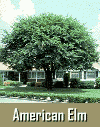Elm
The elm, stately with its vase-shaped, broad crown, is a tree whose history is closely linked to much of American history. While the American elm was once the dominant street and shade tree in many Midwestern and Eastern communities, the outbreak of Dutch elm disease in Ohio in 1930 signaled the end of an era. This noble tree generally has scaly or furrowed bark and deciduous, sawtooth-edged leaves, known for their lustrous green summer color and attractive fall yellow-gold. While American elm continues to grow in the United States, its numbers have been greatly reduced by Dutch elm disease. Six elms are native to the United States, all in the eastern half of the country. Many introduced elms are planted as well.
The Elm’s Place in History
Because of its hardy adaptability and longevity-one tree in New York is estimated at more than 650 years old-the elm is associated with more historical events than any other American tree. The roster of famous Americans who have cultivated or in some other way been connected to the elm includes George Washington, Abraham Lincoln, Daniel Boone, Henry David Thoreau, and William Penn. In helping settle the country, the tree has been used to make everything from wagon wheels to folk remedies, with current uses including agricultural implements and sporting goods, barrel staves, industrial flooring, and boxes and crates.
Some Common Species
American elm (Ulmus americana) is a large tree widely known for its vase-like shape and rounded, multi-branched crown atop a thick, powerful trunk. It usually grows from 60 to 80 feet tall with a crown two-thirds as great. Before the onset of Dutch elm disease, American elm was one of the most common street and shade trees across much of the United States. Its native range in the East extends from New England to Florida and westward to the foot of the Rocky Mountains, though today it also grows, far from its natural range and free of disease, on western sites including throughout much of California. While spray treatments and other techniques are helping keep some of the remaining mature American elms alive, disease continues to destroy many. (Grows in hardiness zones 3 to 9.)
The Chinese or lacebark elm (Ulmus parvifolia) is a medium sized tree, typically 40 to 60 feet tall with a 30 to 40 foot spread and a graceful oval crown. This hardy and adaptable tree is so ideal a landscape choice as to be named a “tree of the future” by noted tree authority Michael A. Dirr. It is attractive both for its form and because of its ability to grow in diverse conditions, free of the diseases that ravage many other elms. This landscape standout earned the name lacebark elm for its distinctive bark, which is mottled instead of ridged as in other elms, and often creates colorful patterns on the tree’s trunk. (Grows in hardiness zones 4 to 9.)

